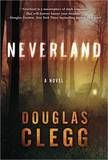Neverland / Douglas Clegg
 Vanguard Press / April 2010
Vanguard Press / April 2010
Reviewed By: Daniel R. Robichaud
One part coming of age story and one part atmospheric horror tale, Douglas Clegg's Neverland is one hell of a novel.
Georgia's Gull Island (rather a peninsula with an ambitious geographical name) is hot and humid, a home to flies and jellyfish, and possesses a bloody history. It is an isolated and generally lousy place to spend the summer. However, young Beauregard Jackson's parents are dragging him, his sisters, and infant brother for that very just purpose. Beau's maternal grandmother lives there, and summers offer time for a family reunion. Beau expects to be uncomfortable and annoyed. In addition to the humidity, the grown-ups tend to either drink or bicker (or both). Beau does not expect to discover the family's buried legacy or the darkness of growing up. However, over the novel he does, thanks to his weird cousin Sumter and the remote shack dubbed "Neverland". This is a place where no grown-ups are allowed, where imagination runs free. It is a site of dark miracles, and home to Sumter's god.
In time, Beau and his sisters become involved in Sumter's personal mythos. The four play at blasphemy by writing filthy messages on the walls and sacrificing "inconsequential" animals. Sumter plays high priest, communicating the tenets of a mysterious and monstrous divinity that speaks directly to him, while promising profound changes through a grand sacrifice to come. Worship begins as a game, but soon transforms into something deadly serious.
Originally published in 1991, Neverland was Douglas Clegg's third novel. The years have done little to reduce its effectiveness. Set in an indeterminate summertime between the 1960s and 1980s, the story fuses a rich atmosphere, supernatural born dread, and well drawn characters to create a rather uneasy coming of age story. The Vanguard Press edition is the novel's first trade paperback presentation. The story is accompanied by several eerily effective drawings by Glenn Chadbourne.
Narrator Beau's observations are conveyed with vivid-dream clarity. The voice Clegg adopts for him is touched with equal measures of wonder and regret. Most of the characters are well rounded; some secondary characters come across flat but they are nevertheless effective in their roles. This sensitive attention to personalities intensifies the book's many menacing sequences.
Neverland is something of a seed crystal to Clegg's subsequent novel, The Hour Before Dark, wherein another childhood game calls up a mysterious, malevolent presence. This is not to suggest The Hour Before Dark completely revisits or revises this earlier work. The two novels are thematically comparable yet individual. Still, readers familiar with Hour will find its themes and motifs evident, as well as a snippet or two of dialogue common to both sources (the phrase "I am the Daddy," is equally haunting in both novels). These two books reflect each other, tackling similar material from different viewpoints: in The Hour Before Dark, the haunting presence lingers until the characters reach adulthood, while Neverland tells the tale with a more innocent cast.
Innocent, however, means neither blameless nor stupid. The kids in this novel can be pretty nasty. They make plenty of poor choices. They share their parents' intolerances and failings, but they are also capable of strengths their parents can no longer achieve. In fact, the grown-ups in the story are the novel's least sympathetic characters, behaving childishly when they should know better. Their children instead struggle for a semblance of maturity and often fall short, finding themselves drawn into painful and fearful consequences beyond their understanding.
A strong awareness of horror fiction's history informs this novel. Subtle allusions to works by such authors as M. R. James or Algernon Blackwood pepper the text, adding depth and resonance. However, Neverland's final quarter includes a lengthy section directly tied to one of Arthur Machen's most famous pieces, which is a little disappointing. This section is less a reference than it is a recreation, which is metaficitonally intriguing yet tedious to those familiar with the source material. This particular tale has inspired big works from a host of horror writers – including Bentley Little, H.P. Lovecraft, and Peter Straub – because it's moving, inventive, and creepy. Inclusion makes sense with the world Clegg has created, but its introduction arrives with too heavy a hand.
Readers should also be wary that time's passage is fluid in this book, days blur with little notice. While this emulates the summer days of Bradburian youth, it also makes keeping track of the timeline sometimes difficult. Night falls fast, and days blend. The characters are all at dinner together, and then the children are in Neverland, and then they are back at dinner together. While it promotes the dream-like quality of the narrative, it can be disorienting.
In the end, Neverland's merits outweigh its difficulties. The novel achieves a disturbing otherworldliness and honest empathy. A bad book with good characters is still often a good read; Neverland is a nearly-great book with good characters and is a memorable experience.
Purchase Neverland by Douglas Clegg.



